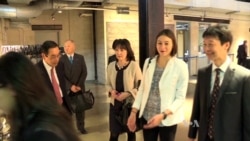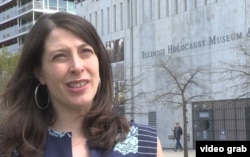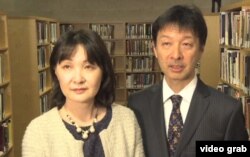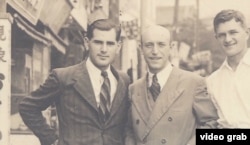Amid preparations for the end of a semester at Northwestern University – where Arielle Salomon is pursuing a master's degree in business administration – the 28-year-old is taking time out of her busy schedule to pause and appreciate what she says has been her fortunate life.
“Everyone has their story about why they are here, and what challenges they’ve overcome, so it’s important to remember that,” Salomon told VOA. “I’ve grown up and been so lucky to have been sheltered from war.”
Sheltered perhaps, but Salomon is very much shaped by it.
When Germany invaded Poland during World War II, her grandfather, Abram Salomon, fled to Lithuania to avoid the fate of many Jews in the Holocaust.
“His whole family was murdered, except for him and his brother, who survive, so it’s incredible … it’s amazing that they escaped," Arielle Salomon said.
As amazed as she is that they escaped, she also ponders an alternate reality.
It’s one in which Arielle Salomon wouldn’t be giving this interview, nor be able to appreciate much of what’s she’s experienced already in her young life, all of it possible because of the actions of one man a continent away and 76 years ago.
'Japanese Schindler'
“People call my grandfather the Japanese Schindler,” says Chihiro Sugihara, referring to the famous German businessman who helped saved hundreds of his Jewish workers.
Chihiro Sugihara’s grandfather, Chiune, was a diplomat stationed at the Japanese consulate in Kaunas, Lithuania, at the onset of World War Two, as many Jewish refugees fleeing the Nazi occupation of Poland applied for visas to leave Europe.
It put Chiune Sugihara in a difficult position. Without clear guidance from his government, he acted on his own, deciding to grant 10-day transit visas through Japan for hundreds who applied.
“He knew that the consequence of going against that order could impact his future, his career, and the livelihood of his family,” said Shoshana Buchholz-Miller, with the Illinois Holocaust Memorial and Education Center. “He took a chance.”
Chiune Sugihara and his wife began signing visas in July 1940.
By the time he was forced to leave Kaunas several weeks later after closing the Japanese consulate, Chiune Sugihara issued more than 2,000 visas that allowed as many as 6,000 Jewish refugees to escape.
“Today there are tens of thousands of people alive who would not be alive had he not taken that chance,” Buchholz-Miller said.
Arielle Salomon’s grandfather, Abram, received one of Sugihara’s visas, and traveled to Japan and parts of Asia, where he, his brother and other refugees waited out the war.
“We have my grandfather’s visa framed at home as a testament, a reminder, to this incredible story,” she explained. “The world had turned against the Jews, and this man saved my family.”
Thousands alive today
The Simon Wiesenthal Center estimates as many as 40,000 descendants like Arielle Salomon are alive today because of Chiune Sugihara.
But after the war, he returned home in obscurity, and rarely spoke about the experience.
“I think to protect the family,” Chiune’s granddaughter Madoka Sugihara explained in delicate Japanese as her brother Chihiro translated. “Because he issued the visa against the government orders and he tried to not have anything happen to us because he went against the order.”
Chihiro Sugihara said he can only remember one time when his grandfather talked about Lithuania.
“He left some kind of memos, and when I was like 13 or 14 years old, he ordered me to copy the memos,” he told VOA. “At the time I was small so I didn’t understand exactly what that means. So one sentence by sentence I had to ask my grandfather, what does that mean, how to write, how to read it. And then he start to explain what had happened.”
Buchholz-Miller said, “In Judaism, they say that the highest form of charity is anonymous. I think he really exemplified not doing it for the accolades but doing what he thought was right.”
That earned him the honor of “Righteous Among the Nations,” one of Israel’s highest honors.
'Absolutely a hero'
There’s another title Buchholz-Miller said Sugihara deserves: “I think he absolutely is a hero.”
His grandson is more modest. “Hero? I think he doesn’t want to be the hero. He just do what he need to do.”
One of the visas Chihiro Sugihara’s grandfather issued is now part of an exhibit at the Illinois Holocaust Museum and Education Center, the setting where Arielle Salomon was finally able to meet Sugihara’s family for the first time … to express her gratitude directly to two of the grandchildren of the man who saved her family.
“It’s something very emotionally overwhelming,” she said after struggling for weeks to plan what she would say to Chihiro and Madoka Sugihara.
“Our grandfathers were both in this incredibly trying moment. By piecing together this, it's amazing to remember how they survived the war," she said.
'Nice to meet' descendants
“We didn’t do anything specially,” Chihiro Sugihara admits. “But today we visit here the Holocaust museum and talk to the people and when we meet the people we realize such important things. It is difficult to say but it is always nice to meet a descendant of someone who was saved, and very impressed.”
The Sugiharas have heard many stories of escape and survival in their travels around the world, most focused on their grandfather’s act of mercy, a lasting reminder that to many he remains a hero.
“People made him a hero. For me he was just a good grandfather," Chihiro Sugihara said.











